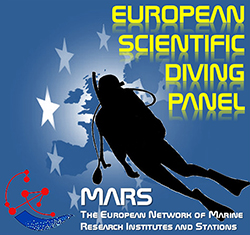– Legal status of scientific diving
From July 2014 scientific diving, i.e. diving for research purposes organized by universities and research institutes; referred to in art. 1. paragraph 3 points 3 of the Act of 17 October 2003 on underwater works (i.e. OJ of 2014, item 1398, as amended) is recognized by law and no longer subjected to the strict regulations applied to commercial diving. At the same time no other regulations governing scientific diving have been issued. Therefore different institutions introduce their own internal rules and code of practice, like the Institute of Oceanology Polish Academy of Sciences (IO PAN, presented briefly below), on the basis of the existing ESD and AESD standards. A check-out dive is a common practice for new members joining a SD team.
– Medical examinations – fitness to dive
The examinations for professional diving are generally valid for 12 months, but in special cases the doctors may extend the validity up to 24 months. The hosting institutes decides if your medical examination is valid or not.
– Insurance
Institution provides a professional diving insurance for employees and doctoral students participating in the dives covered by their internal regulations. The institution can provide insurance to external persons participating in the dives, if possible. In the event of failure to provide insurance by the host institution, external persons are obliged to deliver the Diving Officer the original and a copy of the current diving insurance. Its coverage cannot be less than that of host institution employees. Diving of uninsured persons is not allowed.
– Decompression issues
Within internal IO PAN regulations dives with formal decompression are entitled to persons with a minimum “Advanced Nitrox level”. In regions remote from civilization, where the distance from the nearest decompression chamber is significant (i.e. transport of a person will exceed one hour), diving with a formal decompression exceeding 15 minutes is prohibited. The choice of decompression planning method is for the Diving Officer to decide, based on a risk assessment. There must be at least one dive computer used per diving pair.
– First Aid
All SD team members should be familiar with all first aid equipment available and needed, including oxygen administration to diving accident casualties. Diving may be performed by a diver who has completed first aid training in the last five years.
– Breathing gas
It is allowed to dive up to 33 meters with air. Mixed gases may be used according to the qualifications and risk assessment.
– Volunteers and students
External people can take part in diving if all of the following conditions are met. Such a person:
* has at least the minimum qualifications established for employees and doctoral students (i.e. CMAS* / Level 2 “Autonomous Diver” according to EN 14153-2 standard) ,
* has a valid medical certificate confirming that there are no contraindications to participate in diving
* has a diving insurance. Its coverage is not less than that of employees
* has equipment with a current service inspection and legalization
* will read the Regulations and undertake to comply with them
* has the agreement of the Diving Officer to his/her participation in the dive
PDF
